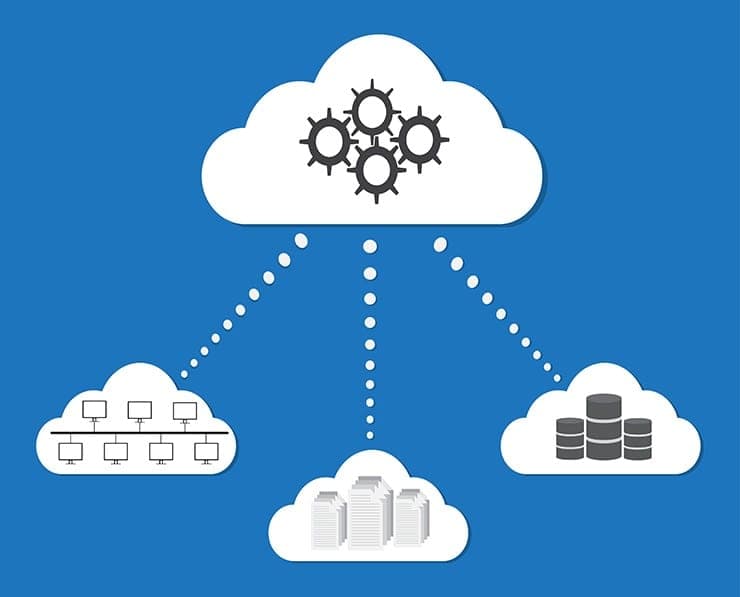Student Feedback
1V0-701: VMware Certified Associate - Digital Business Transformation (VCA-DBT) Certification Video Training Course Outline
Getting Started
VMware Certified Associate 6 (Re...
VCA-DBT - vSphere
Getting Started
1V0-701: VMware Certified Associate - Digital Business Transformation (VCA-DBT) Certification Video Training Course Info
VMware 1V0-701 Digital Transformation Solutions: Professional Training Course
Learn VMware fundamentals, cloud computing, and digital transformation to achieve VCA-DBT certification successfully.
What you will learn from this course
• Understand the core principles of virtualization and cloud computing
• Learn the components and benefits of VMware Cross-Cloud Architecture
• Gain knowledge of Software-Defined Data Center (SDDC) concepts and components
• Identify VMware products used for compute, storage, network, and cloud management
• Explore VMware solutions that enable business agility and digital transformation
• Recognize how VMware technologies integrate across data centers and cloud environments
• Develop the ability to align business challenges with VMware technology offerings
• Prepare for the VMware Certified Associate – Digital Business Transformation (VCA-DBT) exam with confidence
Learning Objectives
This course is designed to provide participants with a deep understanding of VMware’s vision for digital business transformation and the technologies that make it possible. Learners will explore how virtualization and cloud computing have reshaped modern IT environments and how VMware solutions create a foundation for agility, efficiency, and innovation. The primary goal is to help participants grasp how VMware’s Cross-Cloud Architecture and Software-Defined Data Center concepts support businesses in transforming their operations and adopting modern hybrid cloud models.
By the end of this course, participants will be able to describe how VMware solutions address key business challenges such as scalability, flexibility, and cost optimization. They will learn to identify the different layers of VMware technology, including compute, storage, network, and management, and understand their interconnections within enterprise environments. Learners will gain insight into the role of automation and orchestration in optimizing cloud resources and maintaining operational consistency across platforms. The course also aims to help students understand VMware’s approach to integrating private and public cloud solutions through its partnerships with global cloud providers.
The course will develop the learner’s ability to articulate the business value of VMware technologies, including how these solutions align with organizational goals. It prepares participants not only for the 1V0-701 exam but also for real-world discussions about digital transformation and IT modernization. The focus is on building conceptual mastery that bridges technical and business perspectives, making learners capable of contributing to technology-driven decision-making within their organizations.
Target Audience
This course is suitable for a broad range of professionals seeking to understand VMware technologies and digital transformation concepts. It is ideal for individuals who are new to virtualization or cloud computing and want to gain foundational knowledge of VMware’s technology portfolio. The course is especially beneficial for those in roles where understanding VMware solutions supports their professional responsibilities, such as IT administrators, consultants, pre-sales engineers, and business analysts involved in technology strategy.
It is also intended for students, recent graduates, and professionals entering the field of virtualization or cloud technologies who aspire to earn their first VMware certification. The course offers the conceptual grounding necessary for future advanced certifications and helps individuals understand how VMware technologies are positioned across different market segments.
Business professionals, managers, and sales teams who interact with clients regarding VMware solutions can also benefit from this training, as it provides a clear understanding of the value and benefits VMware brings to organizations undergoing digital transformation. Overall, it caters to anyone looking to gain a vendor-aligned understanding of how VMware technologies contribute to modern IT infrastructure and cloud adoption strategies.
Overview
The VMware Certified Associate – Digital Business Transformation certification represents an introduction to VMware’s ecosystem of technologies and their role in helping organizations evolve into digital enterprises. The 1V0-701 exam tests a candidate’s understanding of VMware’s Cross-Cloud Architecture, Software-Defined Data Center, and related solutions that enable hybrid and multi-cloud operations. This training course follows VMware’s official exam blueprint, ensuring that every topic and concept aligns with the vendor’s defined learning objectives.
Digital transformation is reshaping how businesses operate, and VMware provides the foundational technologies that make this transformation achievable. Through this course, learners gain an understanding of how VMware solutions integrate compute, storage, networking, and management into a unified software-defined environment. The course explores how the Cross-Cloud Architecture helps organizations maintain control and flexibility while leveraging multiple public and private clouds. It also introduces learners to VMware’s product suite, including vSphere for compute virtualization, vSAN for storage virtualization, NSX for network virtualization, and vRealize Suite for management and automation.
In today’s IT landscape, agility and scalability are critical for business success. Traditional infrastructures often struggle to meet these demands, leading to the rise of the Software-Defined Data Center as a more dynamic and flexible model. Learners will understand how SDDC abstracts, pools, and automates data center resources, allowing businesses to deploy applications faster and manage them more efficiently. The course also covers the evolution of VMware Cloud Foundation and its role in simplifying hybrid cloud deployment and management across on-premises and public cloud environments.
VMware’s solutions extend beyond the data center into end-user computing and mobility through Workspace ONE and Horizon. These technologies enable secure access to applications and data from any device, supporting the growing demand for remote work and digital workspace solutions. Learners will explore how these products contribute to a consistent and secure user experience across devices and locations.
Throughout the course, the emphasis remains on connecting VMware technologies to business outcomes. Students will learn how digital transformation initiatives are supported by VMware’s infrastructure and cloud management solutions, helping organizations optimize costs, enhance security, and accelerate innovation. Each topic builds upon the previous one, gradually creating a complete picture of how VMware empowers businesses to manage complex hybrid environments efficiently and strategically.
The course also highlights VMware’s partnerships with major cloud providers such as AWS, Azure, and Google Cloud, explaining how these integrations enable seamless multi-cloud operations. Learners will understand the significance of VMware Cloud on AWS, which combines VMware’s trusted infrastructure with the elasticity and scalability of the public cloud. This approach allows organizations to extend their data centers without major rearchitecture, offering a consistent operational experience across all environments.
In addition, participants will explore the concept of network and security virtualization through VMware NSX, a key component of the SDDC. NSX introduces a new approach to networking by creating virtual networks independent of physical hardware, enabling more flexible and secure application deployment. The discussion will also touch on micro-segmentation, which provides fine-grained security at the workload level, reducing the risk of internal threats and breaches.
By understanding these core principles, learners will develop a comprehensive foundation that will not only prepare them for the certification exam but also provide real-world knowledge applicable to IT operations and digital strategy. The course ensures that learners are comfortable explaining VMware’s vision, identifying the value of its solutions, and recognizing how these technologies work together to drive digital transformation across industries.
Prerequisites
There are no strict prerequisites for this course or the VCA-DBT certification, making it accessible to anyone with an interest in virtualization and cloud technologies. However, having a basic understanding of IT concepts, data centers, and cloud computing principles is beneficial for easier comprehension of the material. Familiarity with fundamental networking and storage concepts can also help learners better grasp the technical aspects of VMware’s solutions.
A general awareness of how businesses use technology to achieve strategic goals will provide useful context for understanding VMware’s digital transformation approach. Participants who have previously worked with any virtualization or cloud management tools will find the learning experience smoother, though this is not mandatory. The course is structured to build knowledge progressively, starting with foundational concepts before advancing to more integrated and solution-oriented topics.
Learners are encouraged to approach the course with curiosity and readiness to explore how modern IT systems are evolving. The training provides clear explanations and practical examples, ensuring that even those with minimal technical experience can understand VMware’s vision and apply the knowledge effectively in their professional contexts.
Course Modules / Sections
This training course is divided into multiple structured modules designed to provide a complete understanding of VMware’s approach to digital business transformation. Each module focuses on a specific area of VMware’s ecosystem and technology portfolio. Together, they build a holistic view of how VMware solutions enable organizations to transform their infrastructure, optimize performance, and move toward a software-defined and cloud-enabled future.
The initial modules introduce the core concepts of virtualization and cloud computing, setting the foundation for understanding VMware’s technologies. Learners are guided through the principles of virtualized compute, storage, and network layers that make up the Software-Defined Data Center. The course then transitions to exploring VMware’s Cross-Cloud Architecture, which unifies private, public, and hybrid cloud environments into a single manageable framework.
Subsequent modules delve deeper into VMware’s major product lines. Learners explore VMware vSphere for compute virtualization, VMware vSAN for software-defined storage, and VMware NSX for network virtualization and security. The course highlights how these technologies integrate under the SDDC model, providing agility and scalability to modern IT environments.
A key focus is also given to VMware’s cloud management tools, particularly the vRealize Suite, which brings automation, orchestration, and intelligent operations into hybrid infrastructures. Learners gain insights into how vRealize Automation and vRealize Operations streamline IT service delivery and optimize resource utilization.
Further modules examine VMware’s end-user computing solutions, such as Workspace ONE and Horizon, which enable secure access to digital workspaces and applications. These topics demonstrate how VMware extends its influence beyond the data center, supporting remote work, mobility, and unified endpoint management.
The course then explores VMware’s cloud offerings, including VMware Cloud Foundation and VMware Cloud on AWS. These sections explain how VMware provides flexibility for enterprises to run workloads across multiple clouds with consistent management and infrastructure. Participants learn how VMware’s partnerships with cloud providers allow seamless integration between on-premises and public cloud environments.
The final module focuses on the business value of VMware solutions. It examines how organizations achieve greater agility, cost savings, and innovation through VMware’s technologies. Learners understand how VMware enables digital transformation by aligning IT capabilities with business objectives. This section also covers the strategic benefits of adopting a software-defined approach to IT, including faster deployment times, improved resource utilization, and simplified management.
Each module is structured to progressively build understanding, combining conceptual learning with examples that illustrate how VMware technologies are applied in real-world environments. The course ensures that participants not only gain technical knowledge but also understand how these technologies drive strategic outcomes for businesses embracing digital transformation.
Key Topics Covered
The training program comprehensively covers all key topics required to master VMware’s foundational technologies and prepare for the VMware Certified Associate – Digital Business Transformation certification. These topics reflect VMware’s official exam blueprint and core technology domains.
The course begins with an introduction to virtualization fundamentals, explaining how hardware abstraction allows multiple operating systems and applications to run independently on shared physical infrastructure. It describes the role of the hypervisor, the core component that enables virtualization, and introduces VMware vSphere as the industry-leading platform for virtualized compute resources. Learners understand how vSphere forms the foundation of the Software-Defined Data Center by managing virtual machines and optimizing resource allocation.
Storage virtualization is explored through VMware vSAN, which aggregates local storage devices into a shared, resilient storage pool. This section focuses on how vSAN simplifies storage management, enhances performance, and provides scalable solutions for modern applications. Learners study the operational principles of vSAN and its integration with other VMware components.
Networking and security virtualization are addressed through VMware NSX. This topic introduces the concept of decoupling network functions from physical hardware, creating a flexible and programmable network infrastructure. Participants explore NSX features such as micro-segmentation, network automation, and security policies. These capabilities provide enhanced security and agility for data centers and cloud environments.
The Software-Defined Data Center module brings together compute, storage, and network virtualization, illustrating how these components operate cohesively. The concept of automation and policy-based management is emphasized as the key to achieving agility, scalability, and cost efficiency in modern IT operations. Learners gain an understanding of how SDDC enables IT teams to provision and manage resources dynamically while maintaining governance and control.
The course also dedicates significant attention to cloud computing and VMware’s Cross-Cloud Architecture. This section explains how VMware enables organizations to operate consistently across private and public clouds. Learners explore VMware Cloud Foundation as the integrated platform that brings together compute, storage, network, and management components into a unified framework. The discussion includes VMware’s collaboration with cloud providers, emphasizing VMware Cloud on AWS as an example of hybrid cloud deployment.
VMware’s management and automation tools are introduced through the vRealize Suite. Learners study vRealize Automation, which simplifies service delivery and operational management, and vRealize Operations, which provides intelligent analytics for optimizing performance and capacity planning. This section demonstrates how automation and intelligence reduce manual effort and enhance operational efficiency.
End-user computing and digital workspace solutions form another core topic area. The course covers VMware Workspace ONE and Horizon, explaining how they provide secure access to applications and data from any device. Learners understand how Workspace ONE integrates identity, mobility, and endpoint management to support flexible and secure digital workspaces.
The final section highlights VMware’s strategic vision of digital transformation. Learners explore how VMware technologies address challenges such as scalability, cost management, and security while supporting innovation. The course emphasizes the business outcomes of VMware adoption, showing how companies leverage VMware solutions to accelerate their journey toward a digital enterprise.
Teaching Methodology
The teaching methodology for this course combines conceptual instruction, visual explanation, and practical understanding to create an engaging and effective learning experience. The approach emphasizes clarity, structured progression, and real-world relevance to ensure learners can connect theoretical concepts with practical applications.
The training begins with instructor-led sessions that provide foundational knowledge through clear explanations of virtualization, cloud computing, and digital transformation principles. Visual aids, diagrams, and architectural models are used to illustrate how VMware technologies interconnect within a data center and across hybrid cloud environments. These sessions establish the conceptual framework necessary for understanding the detailed topics that follow.
Demonstrations play an important role in reinforcing theoretical learning. Instructors showcase how VMware tools operate in real-world scenarios, allowing participants to visualize concepts such as virtual machine creation, storage pooling, and network segmentation. These demonstrations are carefully designed to highlight VMware’s core functionalities and align them with the learning objectives of each module.
Interactive discussions and scenario-based learning are also incorporated to deepen understanding. Learners are encouraged to analyze business challenges and explore how VMware solutions can address them. This method helps participants think critically about technology adoption and its impact on business transformation.
Hands-on labs provide practical exposure to VMware technologies. These exercises guide learners through essential tasks such as deploying virtual machines, configuring storage, and managing networks within virtualized environments. The labs simulate real IT environments, enabling learners to apply their knowledge directly and build confidence in working with VMware’s ecosystem.
To ensure consistent engagement, the course includes periodic knowledge checks and self-assessment exercises. These help learners evaluate their understanding of key concepts before progressing to advanced topics. The assessments are not meant to test memory but to strengthen comprehension through reflection and practice.
The course is designed to cater to varied learning preferences. Visual learners benefit from detailed diagrams and architecture maps, while analytical learners engage deeply with conceptual explanations and case-based examples. The structured progression ensures that every participant, regardless of prior experience, develops a complete understanding of VMware’s technology framework.
In addition to technical instruction, the teaching methodology emphasizes the strategic dimension of VMware technologies. Instructors provide insights into how organizations adopt VMware solutions to improve agility, manage hybrid cloud operations, and achieve digital transformation goals. This holistic perspective ensures that learners not only acquire technical competence but also understand the broader business implications of technology deployment.
Assessment & Evaluation
Assessment and evaluation are integral components of the training program, designed to measure comprehension, reinforce learning, and prepare participants for the certification exam. The assessment strategy combines theoretical evaluation with practical understanding, ensuring that learners achieve both conceptual clarity and applied competence.
Throughout the course, learners encounter periodic quizzes and review sessions that assess their understanding of each module’s key concepts. These formative assessments help participants identify areas that require additional focus. They are structured to reflect the format of the VMware Certified Associate – Digital Business Transformation exam, enabling learners to become familiar with the style of questions and the type of reasoning required.
Hands-on labs are also evaluated to gauge practical proficiency. Participants demonstrate their ability to perform basic tasks such as configuring virtual machines, managing storage resources, and implementing network policies using VMware technologies. These exercises provide a real-world measure of the learner’s ability to apply theoretical knowledge in simulated IT environments.
At the end of the course, a comprehensive review session consolidates all the concepts covered. This includes a structured summary of virtualization, Software-Defined Data Center components, Cross-Cloud Architecture, and cloud management tools. Learners engage in reflective discussions about how these technologies support business transformation.
Final assessments include a practice test designed to emulate the actual exam experience. The test assesses knowledge of VMware’s architecture, solution portfolio, and business use cases. Participants receive feedback highlighting strengths and areas for improvement. The purpose is to ensure readiness for the 1V0-701 certification exam and to reinforce understanding of VMware’s key principles.
Evaluation also considers participation, engagement, and problem-solving abilities demonstrated during the training. Learners who actively contribute to discussions, complete exercises diligently, and show improvement across assessments are recognized for their performance. This approach promotes continuous learning and motivation.
By the end of the course, participants achieve a balanced understanding of both technical and strategic aspects of VMware technologies. The evaluation process ensures that learners not only retain the knowledge necessary to pass the certification exam but also develop the analytical and practical skills needed to apply that knowledge effectively in their professional roles.
Benefits of the Course
The VMware Certified Associate – Digital Business Transformation (VCA-DBT) training course offers a wide range of benefits that extend beyond exam preparation. It builds a strong foundation in VMware technologies while also enhancing the learner’s understanding of how digital transformation is reshaping IT operations across industries. The course bridges the gap between technical concepts and business strategy, allowing participants to appreciate the broader value of VMware’s approach to virtualization, cloud computing, and infrastructure modernization.
One of the primary benefits of this course is the comprehensive knowledge it provides about VMware’s ecosystem. Learners gain a clear understanding of the core components that make up the Software-Defined Data Center, including compute, storage, and network virtualization. This knowledge is crucial for professionals who wish to build careers in IT infrastructure, as it helps them understand how virtualization forms the foundation for modern cloud environments. Participants learn how VMware’s solutions simplify management, improve scalability, and enhance operational efficiency, which are key factors in today’s fast-evolving digital landscape.
Another significant advantage of the course is its alignment with VMware’s official certification framework. The course is structured around the objectives of the 1V0-701 exam, ensuring that participants are fully prepared for certification. Earning the VMware Certified Associate credential validates a professional’s ability to understand and articulate VMware technologies, making it a strong addition to any IT career path. The certification is widely recognized and respected in the industry, enhancing professional credibility and employability.
The course also provides learners with valuable insights into how VMware technologies drive digital business transformation. Participants develop a conceptual understanding of how organizations transition from traditional data centers to more agile, software-defined, and cloud-based infrastructures. They learn how VMware’s solutions support this transition by integrating private and public cloud environments, automating management processes, and improving resource utilization. This understanding allows learners to engage confidently in conversations about IT strategy, digitalization, and innovation.
Through practical learning and scenario-based discussions, participants gain problem-solving and analytical skills applicable to real-world environments. The course helps learners connect theoretical concepts with practical implementation, enabling them to understand how VMware technologies solve common IT challenges such as resource optimization, security enhancement, and cost efficiency. These skills prepare participants to contribute effectively in professional settings where virtualization and cloud solutions are key business enablers.
Another benefit lies in the course’s focus on cloud management and automation. By learning about tools like vRealize Suite, learners develop an understanding of how automation streamlines operations and reduces administrative overhead. This exposure to automation concepts is valuable in an era where efficiency and speed are critical to IT success. Understanding how to manage hybrid and multi-cloud environments prepares learners for roles that require cross-platform management skills, which are increasingly in demand.
Additionally, the course broadens career opportunities. Professionals who complete the training can pursue roles in virtualization support, systems administration, cloud consulting, or IT management. It also serves as a stepping stone toward advanced VMware certifications such as the VMware Certified Professional (VCP) and VMware Certified Advanced Professional (VCAP), which open doors to specialized and higher-level technical positions.
From an organizational perspective, employees who complete this training bring valuable knowledge that can contribute to improved IT strategy and infrastructure design. They are better equipped to help businesses adopt VMware technologies, reduce operational complexity, and support innovation initiatives. The course promotes a culture of continuous learning, ensuring that professionals remain adaptable in the face of evolving technologies.
Ultimately, this training empowers learners with the confidence to understand and communicate VMware’s vision for digital transformation. It enhances both technical and conceptual expertise, positioning professionals to thrive in modern, technology-driven environments. The knowledge and skills gained through the course create a strong foundation for lifelong learning and professional growth in the virtualization and cloud domains.
Course Duration
The VMware Certified Associate – Digital Business Transformation training course is designed to be comprehensive yet flexible in its delivery. The duration of the course typically ranges from several days to a few weeks, depending on the learning format, the pace of instruction, and the participant’s prior familiarity with VMware concepts. The course structure ensures adequate time for conceptual understanding, practical exposure, and review of key topics aligned with the certification objectives.
For instructor-led classroom or virtual sessions, the course is commonly delivered over a duration of three to five days. These sessions include lectures, demonstrations, and guided discussions covering all modules of the curriculum. The pace of instruction is balanced to ensure that learners grasp both the theoretical and practical aspects of each topic before moving to the next. This duration provides an immersive experience, allowing participants to focus entirely on the learning process.
For self-paced online training, the course can extend over several weeks, giving learners the flexibility to progress according to their schedules. The self-paced model includes recorded lectures, interactive modules, and practice exercises that reinforce learning. This option is suitable for professionals who wish to balance their study time with work commitments. Learners can revisit lessons, repeat exercises, and take additional time to explore topics that require deeper understanding.
The total time investment for this course generally includes instructional hours, hands-on lab sessions, and review exercises. Practical exercises form an important part of the course duration, as they allow learners to apply concepts directly in simulated environments. Participants are encouraged to spend additional time practicing lab exercises and reviewing study materials to strengthen their grasp of VMware’s core technologies.
In addition to the main training period, learners are advised to allocate time for exam preparation. Reviewing VMware’s product documentation, practicing with sample questions, and revisiting key concepts can significantly enhance readiness for the certification exam. A typical learner might invest between 20 to 40 hours in total study time, depending on their background and learning style.
The flexible duration of the course ensures accessibility for a wide range of learners. Those new to VMware technologies can take advantage of the extended learning timeline to fully internalize foundational concepts, while experienced IT professionals can progress more rapidly through familiar sections. Regardless of the learning mode, the course is structured to ensure a complete and thorough understanding of all exam objectives.
The duration also allows sufficient time for discussions on real-world applications and case studies, which are integrated throughout the sessions. This approach helps learners see the direct connection between VMware technologies and business transformation outcomes. By the end of the course, participants are not only prepared for certification but also equipped with the practical knowledge needed to apply VMware solutions in professional contexts.
Tools & Resources Required
To complete the VMware Certified Associate – Digital Business Transformation course, participants require access to specific tools and resources that support learning and practical understanding. These resources include both hardware and software components, as well as study materials that align with VMware’s certification framework.
A stable and modern computer system is essential for accessing course materials, participating in virtual labs, and running basic VMware simulations. The recommended system configuration typically includes a multi-core processor, at least 8 GB of RAM, and sufficient storage space for lab environments or virtual machine images. Reliable internet connectivity is crucial, especially for online learners, to access live sessions, cloud-based labs, and digital learning platforms.
Participants should also have access to VMware software tools used throughout the training. These may include VMware Workstation or VMware Fusion for creating and managing virtual machines on local systems. In some cases, learners may use VMware Hands-on Labs, a cloud-based platform that provides pre-configured environments for practice without the need for local installation. These labs allow participants to experiment with VMware products such as vSphere, vSAN, NSX, and vRealize Suite safely and effectively.
For studying cloud management concepts, learners may require access to VMware’s vRealize Suite or similar management interfaces provided through training environments. These resources help demonstrate automation workflows, policy configurations, and performance monitoring within virtualized infrastructures. The course often integrates guided lab sessions that walk learners through each of these tools step by step.
In addition to software tools, learners benefit from having access to VMware’s official documentation, whitepapers, and product guides. These materials provide detailed explanations of product capabilities, use cases, and configurations, complementing the course content. The VMware Learning Zone and MyLearn platform are valuable resources that offer video tutorials, knowledge articles, and self-assessment quizzes.
Printed or digital course manuals are typically provided as part of the training package. These manuals include module summaries, key definitions, and conceptual diagrams that help reinforce understanding. Learners are encouraged to take notes, highlight key terms, and create quick reference guides for future use.
Other useful resources include study guides and practice exams designed specifically for the 1V0-701 certification. These materials help learners familiarize themselves with exam-style questions and test their knowledge under timed conditions. Reviewing such resources ensures that participants are well-prepared and confident on exam day.
For participants in instructor-led courses, collaboration tools such as video conferencing platforms and digital whiteboards may be used to enhance communication and interactivity. Instructors often use presentation slides, visual diagrams, and demonstration videos to illustrate complex concepts. Learners are encouraged to participate actively, ask for clarifications, and engage in discussions to maximize their understanding.
Overall, the combination of hardware, software, and learning materials ensures that participants have everything they need for a productive training experience. The tools and resources required are designed to provide hands-on exposure to VMware’s technologies while supporting independent study and exam preparation. With the right setup, learners can fully immerse themselves in the training process and gain both theoretical and practical competence in VMware’s digital business transformation solutions.
Career Opportunities
Completing the VMware Certified Associate – Digital Business Transformation (VCA-DBT) training course opens a range of career opportunities for individuals interested in virtualization, cloud computing, and IT infrastructure management. The course provides a strong foundation in VMware’s technology ecosystem, preparing learners for roles that require an understanding of how virtualization supports digital transformation and modern data center operations. As organizations continue to migrate to cloud-based environments, professionals with VMware knowledge are in high demand across multiple industries.
Entry-level roles are often the first destination for individuals who have completed this certification. Positions such as Junior Systems Administrator, Virtualization Support Engineer, or IT Infrastructure Technician are common starting points. These roles involve managing virtual machines, monitoring system performance, and assisting in the deployment of virtualized environments. The skills developed in this course enable professionals to contribute effectively to daily operations while gaining practical experience in VMware technology management.
For professionals already working in IT, the VCA-DBT certification enhances their ability to transition into specialized roles. Positions such as Virtualization Administrator or Data Center Support Engineer require an understanding of the concepts covered in this course, including compute, storage, and network virtualization. Professionals in these roles are responsible for maintaining efficient virtualized infrastructures, troubleshooting issues, and ensuring optimal performance across systems.
Another career path available to certified professionals is within cloud operations and management. Organizations increasingly rely on hybrid and multi-cloud strategies, and VMware technologies are central to these environments. Job titles such as Cloud Operations Specialist or Cloud Support Analyst involve managing workloads across different cloud platforms and ensuring seamless integration between on-premises and public cloud resources. The knowledge of VMware’s Cross-Cloud Architecture and Software-Defined Data Center gained through this course is directly applicable to such roles.
Individuals interested in consulting and solution design can also benefit from this certification. Positions such as Pre-Sales Consultant, Solution Architect Assistant, or IT Business Analyst often require professionals who can bridge the gap between business needs and technology solutions. Understanding VMware’s role in digital transformation allows professionals to engage in discussions with clients, identify pain points, and recommend VMware solutions that align with organizational goals. The course equips learners with the ability to communicate technical concepts clearly, making them valuable contributors in both technical and business discussions.
As professionals gain more experience and continue their learning journey, they can advance to higher-level roles such as VMware Systems Engineer, Cloud Infrastructure Consultant, or Virtualization Specialist. These positions demand a deeper level of technical expertise and often require additional VMware certifications, such as the VMware Certified Professional (VCP) or VMware Certified Advanced Professional (VCAP). The foundational knowledge gained through the VCA-DBT training course provides the necessary base for pursuing these advanced credentials.
Beyond technical positions, the certification also supports career advancement in managerial and strategic roles. IT Managers and Project Leads responsible for overseeing infrastructure modernization projects benefit from understanding VMware technologies and how they contribute to organizational efficiency. This knowledge helps them make informed decisions regarding investments in virtualization and cloud adoption, ensuring that their teams implement solutions aligned with business objectives.
The demand for professionals with VMware expertise continues to grow across various sectors, including finance, healthcare, education, manufacturing, and telecommunications. Companies in these industries depend on virtualization to optimize operations, reduce costs, and increase flexibility. Holding a VMware certification signals to employers that the candidate possesses up-to-date knowledge of industry-standard tools and is prepared to contribute to digital transformation initiatives.
Additionally, freelancers and independent consultants can leverage this certification to expand their service offerings. Many small and medium-sized businesses seek consultants who can design, implement, and maintain virtualized solutions. Having formal VMware training enhances credibility and helps attract clients seeking reliable technical expertise.
The global shift toward cloud computing and the hybrid work environment ensures that VMware-related skills remain relevant for the foreseeable future. Organizations continuously seek professionals capable of managing diverse infrastructures and integrating on-premises and cloud systems. Therefore, completing the VCA-DBT training course not only strengthens one’s current skill set but also ensures long-term career stability and growth potential in the evolving IT landscape.
Conclusion
The VMware Certified Associate – Digital Business Transformation training course represents a significant step toward mastering the principles that underpin modern IT infrastructure. It provides learners with a clear understanding of how virtualization, cloud computing, and automation work together to support business agility and efficiency. The course goes beyond theoretical learning, offering practical insights into VMware’s key technologies, including vSphere, vSAN, NSX, and the vRealize Suite. These tools form the backbone of digital transformation for enterprises around the world, and understanding them positions learners at the forefront of technological innovation.
Through this course, participants develop the ability to articulate how VMware’s solutions help organizations evolve from traditional data centers to software-defined and cloud-based environments. They learn to connect business objectives with IT capabilities, an essential skill in today’s technology-driven economy. The knowledge gained extends beyond exam preparation; it builds a comprehensive perspective on how VMware technologies solve real-world challenges such as scalability, cost optimization, and security.
The course also strengthens problem-solving and analytical skills, enabling learners to approach IT challenges with a strategic mindset. By exploring practical scenarios and hands-on exercises, participants gain confidence in working with virtualization technologies and understanding their business implications. This combination of technical proficiency and business awareness is highly valued in modern organizations seeking professionals who can contribute to both technical execution and strategic decision-making.
In a broader sense, the course fosters adaptability and continuous learning, qualities that are vital in an ever-changing digital environment. VMware technologies continue to evolve, introducing new solutions for cloud management, automation, and hybrid infrastructure. By completing this training, learners build a foundation that allows them to stay current with technological advancements and pursue ongoing professional development through advanced certifications.
The value of the certification extends beyond individual career growth. Organizations benefit from having trained professionals who understand how to leverage VMware’s capabilities to achieve digital transformation goals. Certified individuals can help their teams optimize resources, enhance performance, and deliver scalable IT services that align with business priorities. As a result, they become key contributors to innovation and operational excellence within their organizations.
This training also offers global recognition. VMware certifications are respected across industries and geographies, making this qualification a valuable credential for professionals seeking international opportunities. Whether one’s goal is to work within a corporate IT department, consult independently, or advance into leadership positions, the VCA-DBT certification provides a competitive advantage in the marketplace.
Ultimately, the course embodies the principles of modern IT transformation—flexibility, efficiency, and innovation. It prepares learners not only to pass the certification exam but also to apply their knowledge in practical, impactful ways. Participants complete the training with a solid understanding of VMware’s ecosystem, ready to contribute to the design, implementation, and management of cutting-edge virtualized and cloud-based infrastructures.
Enroll Today
Enrolling in the VMware Certified Associate – Digital Business Transformation training course is an investment in professional growth and technological expertise. The course provides the foundational knowledge required to navigate today’s complex IT environments with confidence. Whether you are beginning your journey in virtualization or looking to strengthen your understanding of VMware’s digital transformation strategy, this course offers the ideal starting point.
By joining the program, learners gain access to structured training, expert instruction, and practical exercises that mirror real-world environments. The comprehensive curriculum ensures that every participant develops a clear understanding of VMware’s Cross-Cloud Architecture and Software-Defined Data Center. These concepts form the basis of modern IT infrastructure and are essential for professionals seeking to advance their careers in virtualization, cloud operations, and IT management.
Enrolling in this course also connects learners with a global network of professionals who share similar goals and interests. Engaging with peers and instructors creates opportunities for collaboration, discussion, and knowledge sharing. This community aspect enhances the learning experience and fosters connections that may benefit participants throughout their careers.
The training accommodates diverse learning styles and schedules, offering flexible delivery modes, including instructor-led sessions and self-paced online learning. Each participant can choose the format that best suits their preferences, ensuring an effective and convenient educational experience. Upon completion, learners will have developed not only technical knowledge but also the confidence to apply their understanding in real-world scenarios.
Taking this course is a proactive step toward building a successful career in IT and cloud computing. It demonstrates commitment to continuous improvement and professional excellence. The certification that follows serves as proof of the learner’s capability to understand, explain, and apply VMware technologies in various business contexts.
For professionals aiming to stay competitive in a rapidly evolving digital landscape, this course provides the essential knowledge needed to adapt and thrive. Enroll today to begin the journey toward becoming a recognized VMware Certified Associate and contribute to shaping the future of digital business transformation.













